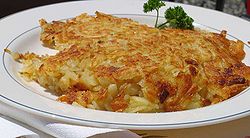Rösti

A plate of rösti with a parsley garnish
|
|
| Alternative names | Potatoe Pancakes (Acadian dish) |
|---|---|
| Type | Side dish |
| Place of origin | Switzerland |
| Region or state | Canton of Bern |
| Main ingredients | Potatoes, butter or other fat |
| |
|
Rösti ([ˈrøːʃti]) or röschti is a Swiss dish consisting mainly of potatoes, in the style of a fritter. It was originally a breakfast dish, commonly eaten by farmers in the canton of Bern, but is now eaten all over Switzerland and around the world. The French name röstis bernois makes direct reference to the origins of the dish.
Many Swiss people consider rösti to be a national dish. Rather than considering it a complete breakfast, it is more commonly served to accompany other dishes such as "Spinat und Spiegelei" (spinach and fried eggs, sunny side up), cervelas or Fleischkäse. It is commonly available in Swiss restaurants as a replacement for the standard side dish of a given meal.
Rösti dishes are made with coarsely grated potato, either cooked or raw. The potatoes are either parboiled or grated raw. Depending on the frying technique, oil, butter or another fat may be added (and usually salt and pepper). It is also common to fry the grated potato without additional fats. The grated potatoes are shaped into rounds or patties, usually measuring between 3–12 cm (1 to 5 inches) in diameter and 1–2 cm (0.5 inch) thick. Rösti are most often pan-fried and shaped in the frying pan during cooking, but they can also be baked in the oven. Although basic rösti consists of nothing but potato, a number of additional ingredients are sometimes added, such as bacon, onion, cheese, apple or fresh herbs. This is usually considered to be a regional touch.
In Swiss popular cultural ethos, rösti are predominantly eaten in German-speaking regions, although they can be found easily elsewhere in the country. Rösti dishes are portrayed as a stereotypical part of the Swiss-Germanic culture, as opposed to Latin culture. The geographic region separating the French- and German-speaking parts of the country is therefore commonly referred to as the Röstigraben: literally the "rösti ditch".
...
Wikipedia
